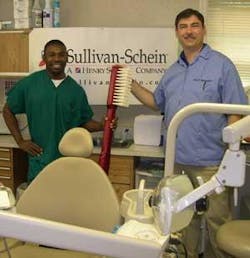Jefferson's tips
by Jefferson Hill Jr., RDH
I made an untraditional debut into the dental industry. As an equipment service technician, my job was a natural extension of my fascination with mechanics. Even though I later made the career transition to dental hygiene, my early days as a service tech imbued an invaluable knowledge about good equipment repair and maintenance, particularly in the hygienist's operatory.
The secret to controlling costs in a dental office, maintaining office productivity, and prolonging or even extending the life of dental equipment is to stop problems before they begin. But there are other common mistakes new hygienists, dental assistants, and office staff make that damage or impair equipment. Here are some steps to help maintain your operatory, as well as some helpful hints I've picked up along the way.
• Learn how to use the equipment properly. We all know that dentists, like most small business owners, are pressed for time. While each one might intend to formally train staff on equipment operation, many hygienists learn how to operate equipment through trial and error.
But somebody must pay for that trial and error. I liken this to learning to drive a car with a manual transmission, without an instructor. Once it's over, you may know how to drive a stick shift, but chances are you'll have to replace the clutch. The same applies to equipment in the hygiene operatory. Don't hesitate to ask questions of service technicians, and consider taking a formal course in equipment operation. This will add to your marketability and list of professional qualifications.
• Be observant. Notice changes in equipment operation, and bring them to the dentist's attention. For instance, black residue at one of the joints of the equipment could mean that the brake is wearing out or there is abnormal wear. Operators may be moving the trays up and down without using the brake release button. Any changes, no matter how minute, could signify pending problems with the equipment. Never hesitate to speak up about it.
• Encourage preventive maintenance. Again, I will use the automobile analogy. Without regular tune-ups, oil changes, and inspections, a car can't, and won't, run optimally. Most dental practitioners are searching for ways to control costs and maximize profitability — this is one of the simplest ways to do so.
For a small investment of several hundred dollars per year, an office can schedule equipment "checkups" once or even twice a year that will save thousands of dollars in the long run. Some of the more progressive dental supply companies are even allowing practitioners to customize their plans. For example, ProService, the onsite equipment and repair division of Sullivan-Schein, encourages customers to schedule service checks before a problem arises, tailors preventive maintenance programs based on a practitioner's needs and budgets, and provides a technician to check major office hardware such as the compressor, drain tank, and vacuum system.
Whenever possible, encourage your office to schedule these checkups before problems occur. Everyone wins in the long run.
• Develop a routine. One of the keys to maximizing your efficiency at work is to develop a maintenance routine before leaving the office. I compare this with the prompt on your computer to save all documents before shutting down. Before you start and begin work, make sure your operatory is in proper order. Here is a checklist of the things I do on a regular basis:
• Clean out the lines with the purge valves.
• Clean the strainer for the saliva ejector and vacuum system.
• Check the location of your foot pedal, rheostat, and ultrasonic scaler. Make sure none have inadvertently been placed under the chair, where they run the risk of being crushed when the chair is moved up and down.
• Oil dental handpieces. Lubricate the joints every two weeks with just a few drops of oil, so that they are easy to remove and adjust.
• Flush out the cuspidor. Every night, flush an enzyme through the cuspidor to purge excess debris.
• Position the dental chair parallel to the base. This will prevent excess wear and tear on the dental chair by preventing patients from using the base as stepstool.
• Change the filters regularly.
Properly maintaining the hygiene operatory is not a solo operation. It requires teamwork on the part of the dentist, hygienist, and dental office staff. Encouraging and practicing good equipment maintenance is one of the most important job skills a hygienist can have. By minimizing repair costs, you're saving your boss and yourself time and money.
Jefferson Hill Jr., RDH,began his career in the dental industry as an equipment repair specialist. After graduating from Essex County Vocational High School in New Jersey, he began workingat the Leonard Engineering Company, a firm that specialized in repairing dental equipment.Mr. Hillused this mechanical and repair skills to support himself through college, and he was awarded a scholarship from the Bloomfield Health Careers Foundation, through which he received his associates degree and a dental hygiene certificate in a collaborative program with the University of Medicine and Dentistry of New Jersey (UMDNJ). Mr. Hill is presently a junior at New Jersey City University studyinga pre-dental curriculum. He can be contacted at [email protected].

